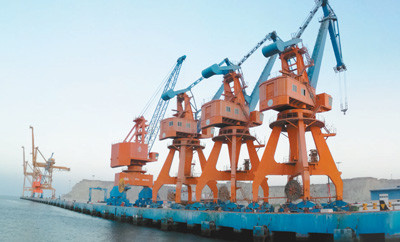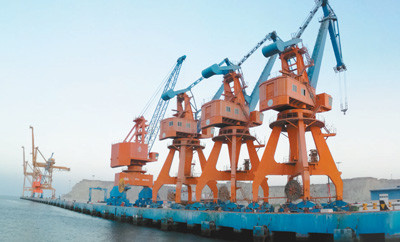By Yang Xun, Meng Xianglin, Huan Xiang, Xu Wei from People’s Daily

Thanks to stronger cooperation between China and Pakistan under the framework of the China-led “Belt and Road” initiative, the Gwadar port, previously a poorly-known port town, has shown new vitality.
The first adventurers of the British East India Company described Gwadar, literally meaning “the valley of wind” in Urdu, as “rugged and moldy.”
Decades later, China-Pakistan ties have injected vitality into the port. Locals have hailed it as a new hope for the nation.
The Gwadar port was first selected as a flagship project of bilateral cooperation under the “Belt and Road” initiative by Chinese President Xi Jinping and his Pakistani counterpart Mamnoon Hussain when the latter visited China in February 2014.
During Xi’s historic visit to Pakistan the following year, the two heads of state listed the port as a pillar of their "1+4" cooperation structure, which means both countries will make the China-Pakistan Economic Corridor as the center, and the Gwadar port, transport infrastructure, energy and industrial cooperation as four key areas to achieve a win-win result and common development.
Babu Gulab, chairman of the Gwadar District Council, recalled the moment when both sides signed the deal two years ago.
“You cannot imagine how excited I was at that time. President Xi is a far-sighted leader,” he said, explaining that others’ vision may cover several years, but Xi’s horizon can reach decades or even a century.
The port is now making headway according to the roadmap drawn by Xi, and as a key part of the “Belt and Road” initiative, its benefits will extend not only to Chinese and Pakistani citizens but also to people in the whole region, Gulab said.
In 2013, local residents could only live on fishing. Every week, there was only one flight from the port to Karachi.
The bilateral cooperation has led to major changes. More people now travel to the area through daily flights, which are fully booked.
Pakistanis told the People’s Daily on a flight to the port that more citizens now rush to the area for business opportunities, and joked that the port can be seen as China’s Xiong’an, a newly-established area in Hebei Province with a promising potential.
When a Chinese company took over the operations of the port in 2013 from the Pakistani government, an 836-square-kilometer parcel of land was valued at 500,000 Pakistani rupees ($4,906.77). The value of the same land area has soared 15 times to 7.5 million rupees, said Muhammad Taimour Muzaffar Chaychi, a Pakistani real estate businessman.
Such changes can be attributed to the bullish attitude towards the port’s prospects, he explained.
If the current construction pace is maintained, the port will transform every three months, Hu Yaozong, deputy general manager of the Gwadar Free Zone Company, told the People’s Daily.
He added that the frequent inspections from businessmen, launches of new projects and new ideas have turned the little fishing village into a global hub and investment haven.
China Overseas Ports Holding Company Ltd.(COPHC) has restored water and power supply as well as the machinery, warehouse and supervision system, and opened flights to China, the Middle East and Africa.
As of 2016, the port has dealt with containers, bulk cargo and ro-ro cargo.
Zhang Baozhong, chairman and CEO of COPHC, told the People’s Daily that compared to other conventional projects, the port is a systematic one covering not only operations, but also the development of the free zone.
“We hope to create a new economic development model for the port by transplanting China’s experience in building special zones or economic development areas to Pakistan, in a bid to drive the country’s industrial transformation,” he said.
The Gwadar free zone will be an exemplary community, Zhang added.
Thanks to improved facilities, the port has become a magnet for business investment. International airports, vocational training centers, modern hospitals, a coal-fired power plant with 300,000 kilowatts of installed capacity, and a desalinization plant that can process 5 million gallon waters each day have been set up on the port.
These investments have improved the locals’ lives and diversified the port’s industrial structure.
“Our life has undergone major changes since the Chinese company came here,” a local fisherman said.
The residents are the primary beneficiaries of the accelerated construction of the Gwadar port. COPHC said it had guaranteed income for local residents.
To this end, the company not only encouraged a closer cooperation between fishermen and the processing businesses, but also offered training to the fishermen.
China’s Red Cross Foundation is now constructing a first aid center on the port. When completed in May, Chinese doctors will be sent to help local patients.
Chinese Ambassador to Pakistan Sun Weidong was impressed by a local old man named Shair Mohammad. Learning that China would donate a school for local students, the 65-year-old man contributed his 752-square-kilometer land.
The Faqeer primary school sits on the donated land.
But Mohammad’s 10-member family is not wealthy. His relatives persuaded him to give up the plan given the soaring land prices, but he insisted on doing it, saying that education is the top priority of Pakistan, and what the Chinese company did is reliable.
Naseem Baloch, one of the old man’s sons, said his father recognizes the significance of the “Belt and Road” and the China-Pakistan Economic Corridor, and believes Xi is a far-sighted leader with a broad horizon.
Pic:
Gwadar Port. (Photo by Meng Xianglin from People’s Daily)
The first adventurers of the British East India Company described Gwadar, literally meaning “the valley of wind” in Urdu, as “rugged and moldy.”
Decades later, China-Pakistan ties have injected vitality into the port. Locals have hailed it as a new hope for the nation.
The Gwadar port was first selected as a flagship project of bilateral cooperation under the “Belt and Road” initiative by Chinese President Xi Jinping and his Pakistani counterpart Mamnoon Hussain when the latter visited China in February 2014.
During Xi’s historic visit to Pakistan the following year, the two heads of state listed the port as a pillar of their "1+4" cooperation structure, which means both countries will make the China-Pakistan Economic Corridor as the center, and the Gwadar port, transport infrastructure, energy and industrial cooperation as four key areas to achieve a win-win result and common development.
Babu Gulab, chairman of the Gwadar District Council, recalled the moment when both sides signed the deal two years ago.
“You cannot imagine how excited I was at that time. President Xi is a far-sighted leader,” he said, explaining that others’ vision may cover several years, but Xi’s horizon can reach decades or even a century.
The port is now making headway according to the roadmap drawn by Xi, and as a key part of the “Belt and Road” initiative, its benefits will extend not only to Chinese and Pakistani citizens but also to people in the whole region, Gulab said.
In 2013, local residents could only live on fishing. Every week, there was only one flight from the port to Karachi.
The bilateral cooperation has led to major changes. More people now travel to the area through daily flights, which are fully booked.
Pakistanis told the People’s Daily on a flight to the port that more citizens now rush to the area for business opportunities, and joked that the port can be seen as China’s Xiong’an, a newly-established area in Hebei Province with a promising potential.
When a Chinese company took over the operations of the port in 2013 from the Pakistani government, an 836-square-kilometer parcel of land was valued at 500,000 Pakistani rupees ($4,906.77). The value of the same land area has soared 15 times to 7.5 million rupees, said Muhammad Taimour Muzaffar Chaychi, a Pakistani real estate businessman.
Such changes can be attributed to the bullish attitude towards the port’s prospects, he explained.
If the current construction pace is maintained, the port will transform every three months, Hu Yaozong, deputy general manager of the Gwadar Free Zone Company, told the People’s Daily.
He added that the frequent inspections from businessmen, launches of new projects and new ideas have turned the little fishing village into a global hub and investment haven.
China Overseas Ports Holding Company Ltd.(COPHC) has restored water and power supply as well as the machinery, warehouse and supervision system, and opened flights to China, the Middle East and Africa.
As of 2016, the port has dealt with containers, bulk cargo and ro-ro cargo.
Zhang Baozhong, chairman and CEO of COPHC, told the People’s Daily that compared to other conventional projects, the port is a systematic one covering not only operations, but also the development of the free zone.
“We hope to create a new economic development model for the port by transplanting China’s experience in building special zones or economic development areas to Pakistan, in a bid to drive the country’s industrial transformation,” he said.
The Gwadar free zone will be an exemplary community, Zhang added.
Thanks to improved facilities, the port has become a magnet for business investment. International airports, vocational training centers, modern hospitals, a coal-fired power plant with 300,000 kilowatts of installed capacity, and a desalinization plant that can process 5 million gallon waters each day have been set up on the port.
These investments have improved the locals’ lives and diversified the port’s industrial structure.
“Our life has undergone major changes since the Chinese company came here,” a local fisherman said.
The residents are the primary beneficiaries of the accelerated construction of the Gwadar port. COPHC said it had guaranteed income for local residents.
To this end, the company not only encouraged a closer cooperation between fishermen and the processing businesses, but also offered training to the fishermen.
China’s Red Cross Foundation is now constructing a first aid center on the port. When completed in May, Chinese doctors will be sent to help local patients.
Chinese Ambassador to Pakistan Sun Weidong was impressed by a local old man named Shair Mohammad. Learning that China would donate a school for local students, the 65-year-old man contributed his 752-square-kilometer land.
The Faqeer primary school sits on the donated land.
But Mohammad’s 10-member family is not wealthy. His relatives persuaded him to give up the plan given the soaring land prices, but he insisted on doing it, saying that education is the top priority of Pakistan, and what the Chinese company did is reliable.
Naseem Baloch, one of the old man’s sons, said his father recognizes the significance of the “Belt and Road” and the China-Pakistan Economic Corridor, and believes Xi is a far-sighted leader with a broad horizon.
Pic:
Gwadar Port. (Photo by Meng Xianglin from People’s Daily)
 Menu
Menu
 ‘Belt and Road’ initiative fuels prosperity of Gwadar port
‘Belt and Road’ initiative fuels prosperity of Gwadar port
















